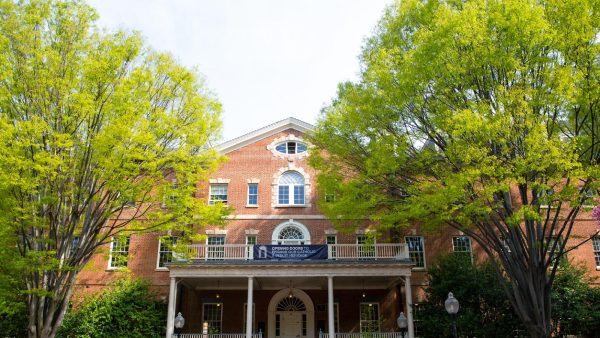A former senior adviser to former President George W. Bush spoke with Georgetown University community members about the future of the Republican Party in an event hosted by the McCourt School of Public Policy Feb. 28.
Karl Rove, who was a senior adviser and deputy chief of staff for President George W. Bush, discussed the development of the Republican Party as part of a series titled “Free Exchange with Michael Strain.” In this series, Michael Strain, an economist and professor of practice at the McCourt School, moderates conversations with policy leaders and experts of various perspectives to provide students insight into an environment that includes a wide range of viewpoints.
Jack Davenport, the senior associate of events at the McCourt School, said the series tries to put students in conversation with leaders who have differing views to foster greater understanding and acceptance.

“It’s to show that we are capable of having those kinds of conversations and that we’re able to bring people from two different sides of the spectrum to one table to have a coherent, respectful and thoughtful dialogue,” Davenport told The Hoya.
The conversation with Rove discussed the factors that led to America’s current political state, such as discontent with politicians going back to the pre-Tea Party era, and how voters can expect the Republican party’s base to shift post-Trump.
Rove said the current state of both the Democratic and Republican parties is more extreme than in the past. He said not enough of the American public participates in the presidential nomination process, resulting in most Americans being unhappy with both candidates.
“We’re in a place where we have two candidates who are the front runners for their respective nominations, and going back to 1936 in the Gallup archives, you cannot find two people who are less popular as front runners for their party’s nomination than these two men,” Rove said at the event.
Rove said it will be difficult for future Republican candidates to mirror Trump’s characteristics, making the future of the party uncertain.
“I think there will be, after Trump, win, lose or draw, a major battle for what the Republican Party stands for,” Rove said. “Does it stand for what people see as part of Trumpism: new isolationism, protectionism, nativism? Or is it going to be a more traditional view of conservatism, which is strong and defensive engagement in the world, limited government concerned with deficits and debt?”
Rove said that it is more likely that the party will return to its traditional values than continue to follow Trump’s ideology.
“My gut tells me it’s going to be more of the latter than the former,” Rove said. “Because I think what’s happening now is people are saying ‘He represents what I believe,’ even when he doesn’t.”
Pasha Ishaq (CAS ’25), a student attendee, said Rove’s discussion of the importance of bipartisanship, especially regarding the Fix NICS Act, a 2017 act sponsored by Sen. John Cornyn (R-Tex.) and Sen. Chris Murphy (D-Conn.) that aimed to strengthen the federal background check system for purchasing firearms, stood out to him. Cornyn received backlash from his party, which has traditionally championed gun rights.
“These are two guys on the complete opposite side of the spectrum, especially on the gun issue, and how they’ve come together to create the Fix NICS Bill, which like no one in the room really heard of, I think that definitely gave me a little bit of restored faith in the system to certain extent,” Ishaq told The Hoya.
Rove said it is important for members of Congress to work together on policy that benefits the country rather than on promoting their self-interests. He added that young people should get involved in political conversations with people who disagree to create real change.
“You better get involved on one party or the other,” Rove said. “It doesn’t matter which, but you ought to get involved in the public life of our country you care about and help people come together. We all have different views on how to get there and we may not get it all done exactly our way, but we have got to come to a stop of where this is about performance art, not making the country better.”








